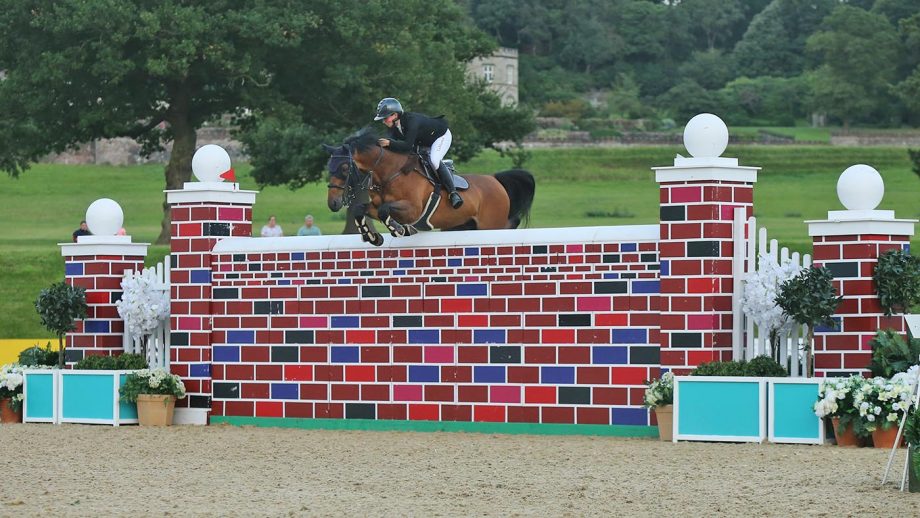The new national showjumping champion tells Sarah Radford about her “eat, sleep, repeat” routine and how she maintains her relentless focus despite the pandemic’s disruptions
Despite nearly three decades in the saddle, showjumper Louise Saywell had never broken a bone until a few weeks ago. The bandage she is wearing on her left hand marks not only her first “serious” injury – albeit a small one – but also the first enforced break from riding she’s had in a career that’s kept her busy since the age of eight.
“I didn’t even fall off!” she informs me over FaceTime. “I was on a five-year-old and it spun round and my hand went into its neck. Normally I would stay on but I had to get off because of the pain.
“When I think of some of the falls I’ve had where I’ve thought I must have done something, but nothing has happened… and then I broke my hand like that.”
{"content":"PHA+QWx0aG91Z2ggTG91aXNlLCAzMCwgc2VjdXJlZCBoZXIgZmlyc3QgaW50ZXJuYXRpb25hbCBzdWNjZXNzZXMgaGFsZiBoZXIgbGlmZXRpbWUgYWdvLCBoZXIgYXBwcm9hY2ggcmVtYWlucyB1bmZsaW5jaGluZ2x5IHdvcmttYW5saWtlLiBJdOKAmXMgYmVlbiBzZXZlbiB5ZWFycyBzaW5jZSBzaGXigJlzIGhhZCBhIGhvbGlkYXksIHNoZSBhZG1pdHMsIGFuZCB0YWtpbmcgYSByaXNrIHJpZGluZyB0aGUgeW91bmcgaG9yc2VzIGlzIHN0aWxsIGFzIG11Y2ggYSBwYXJ0IG9mIGhlciBkYWlseSByZW1pdCBhcyBjb21wZXRpbmcgdGhlIHRvcCBvbmVzLjwvcD4KPHA+4oCcSeKAmW0gbm90IGluIGEgcG9zaXRpb24gbm90IHRvLOKAnSBzaGUgb2JzZXJ2ZXMsIOKAnGJ1dCB0aGVuIEnigJltIHVzdWFsbHkgcXVpdGUgaGFwcHkgdG8gZ2V0IG9uIGFuZCBnaXZlIHRoZSBkaWZmaWN1bHQgb25lcyBhIGdvLuKAnTwvcD4KPHA+PGRpdiBjbGFzcz0iYWQtY29udGFpbmVyIGFkLWNvbnRhaW5lci0tbW9iaWxlIj48ZGl2IGlkPSJwb3N0LWlubGluZS0yIiBjbGFzcz0iaXBjLWFkdmVydCI+PC9kaXY+PC9kaXY+PHNlY3Rpb24gaWQ9ImVtYmVkX2NvZGUtMzEiIGNsYXNzPSJoaWRkZW4tbWQgaGlkZGVuLWxnIHMtY29udGFpbmVyIHN0aWNreS1hbmNob3IgaGlkZS13aWRnZXQtdGl0bGUgd2lkZ2V0X2VtYmVkX2NvZGUgcHJlbWl1bV9pbmxpbmVfMiI+PHNlY3Rpb24gY2xhc3M9InMtY29udGFpbmVyIGxpc3RpbmctLXNpbmdsZSBsaXN0aW5nLS1zaW5nbGUtc2hhcmV0aHJvdWdoIGltYWdlLWFzcGVjdC1sYW5kc2NhcGUgZGVmYXVsdCBzaGFyZXRocm91Z2gtYWQgc2hhcmV0aHJvdWdoLWFkLWhpZGRlbiI+DQogIDxkaXYgY2xhc3M9InMtY29udGFpbmVyX19pbm5lciI+DQogICAgPHVsPg0KICAgICAgPGxpIGlkPSJuYXRpdmUtY29udGVudC1tb2JpbGUiIGNsYXNzPSJsaXN0aW5nLWl0ZW0iPg0KICAgICAgPC9saT4NCiAgICA8L3VsPg0KICA8L2Rpdj4NCjwvc2VjdGlvbj48L3NlY3Rpb24+PC9wPgo8cD5UaGUgTm90dGluZ2hhbXNoaXJlIHlhcmQgc2hlIHNoYXJlcyB3aXRoIGhlciBwYXJ0bmVyIG9mIG5pbmUgeWVhcnMsIGZlbGxvdyBzaG93anVtcGVyIEdyYWhhbSBMb3ZlZ3JvdmUsIGhhcyBhIG1peCBvZiBhbGwgYWdlcyBpbi4gTG91aXNlIHJpZGVzIHByZWRvbWluYW50bHkgZm9yIG93bmVycyBhbmQgYXQgdGhlIHRvcCBzaG93cywgd2hpbGUgR3JhaGFtIHByb2R1Y2VzIHRoZWlyIG93biBob3JzZXMgdGhhdCB3aWxsIHVsdGltYXRlbHkgYmUgZm9yIHNhbGUuPC9wPgo8cD7igJxJdOKAmXMgYWx3YXlzIGdvb2QgZm9yIHRoZSBob3JzZXMgdG8gaGF2ZSBhIGJpdCBvZiBhIGNoYW5nZSwgYW5kIHR3byByaWRlcnPigJkgaWRlYXMgYXJlIGFsd2F5cyBiZXR0ZXIgdGhhbiBvbmUs4oCdIHNoZSBzYXlzIG9mIHRoZSBzZXQtdXAuIOKAnElmIEkgYW0gZ29pbmcgdG8gYSBmb3VyLSBvciBmaXZlLXN0YXIgdGhlbiBHcmFoYW0gd2lsbCBjb21lIGFuZCBoZWxwIG1lIOKAkyBpdOKAmXMgdXNlZnVsIHRvIGhhdmUgc29tZW9uZSBvbiB0aGUgZ3JvdW5kLuKAnTwvcD4KPHA+UmlkaW5nIGlzIGEgam9iIHRvIHdoaWNoIExvdWlzZSB3YXMgYm9ybi4gVGhlIDIyLWJveCB5YXJkIG5lYXIgUmV0Zm9yZCB3YXMgb3JpZ2luYWxseSBlc3RhYmxpc2hlZCBieSBMb3Vpc2XigJlzIGZhdGhlciBNaWtlIFNheXdlbGwsIHdobyBqdW1wZWQgdG8gdGVhbSBmb3VydGggYXQgdGhlIDE5NzIgTXVuaWNoIE9seW1waWNzLCB3aGlsZSBoZXIgbW90aGVyPC9wPgo8ZGl2IGNsYXNzPSJhZC1jb250YWluZXIgYWQtY29udGFpbmVyLS1tb2JpbGUiPjxkaXYgaWQ9InBvc3QtaW5saW5lLTMiIGNsYXNzPSJpcGMtYWR2ZXJ0Ij48L2Rpdj48L2Rpdj4KPHA+Vmlja3kgcHJvZHVjZWQgd29ya2luZyBodW50ZXJzLCBtYWtpbmcgbnVtZXJvdXMgYXBwZWFyYW5jZXMgYXQgdGhlIDxhIGhyZWY9Ii90YWcvaG95cyI+SG9yc2Ugb2YgdGhlIFllYXIgU2hvdzwvYT4gKEhPWVMpLjwvcD4KPHA+SG9yc2VzIHJ1biB0aHJvdWdoIHRoZSBmYW1pbHkgbGlrZSBsZXR0ZXJzIHRocm91Z2ggYSBzdGljayBvZiByb2NrLCBhbmQgaGVyIG9sZGVyIGhhbGYtYnJvdGhlciBBbmRyZXcgYW5kIG5lcGhldyBKYWtlIGhhdmUgYWxzbyBoYWQgaW50ZXJuYXRpb25hbCBqdW1waW5nIGNhcmVlcnMuPC9wPgo8ZGl2IGNsYXNzPSJhZC1jb250YWluZXIgYWQtY29udGFpbmVyLS1tb2JpbGUiPjxkaXYgaWQ9InBvc3QtaW5saW5lLTQiIGNsYXNzPSJpcGMtYWR2ZXJ0Ij48L2Rpdj48L2Rpdj4KPHA+SXQgY29tZXMgYXMgbGl0dGxlIHN1cnByaXNlIHRoYXQgTG91aXNl4oCZcyBlYXJsaWVzdCBtZW1vcmllcyBpbnZvbHZlIHJpZGluZyDigJxpbiBhIGJhc2tldCBzYWRkbGXigJ0g4oCTIG9yIHRoYXQgYSBjYXJlZXIgd2l0aCBob3JzZXMgd2FzIGEgZm9yZWdvbmUgY29uY2x1c2lvbi48L3A+CjxwPuKAnFRoZXJlIHdhcyBuZXZlciBhbnl0aGluZyBlbHNlLOKAnSBzaGUgY29uZmlybXMuIOKAnEkgZGlkbuKAmXQgZXZlbiBkbyBhbnkgR0NTRXMsIEkganVzdCB3ZW50IHN0cmFpZ2h0IGludG8gaXQu4oCdPC9wPgo8ZGl2IGNsYXNzPSJhZC1jb250YWluZXIgYWQtY29udGFpbmVyLS1tb2JpbGUiPjxkaXYgaWQ9InBvc3QtaW5saW5lLTUiIGNsYXNzPSJpcGMtYWR2ZXJ0Ij48L2Rpdj48L2Rpdj4KPHA+QWx0aG91Z2ggc2hlIGRhYmJsZWQgaW4gc2hvd2luZyBmcm9tIGEgeW91bmcgYWdlIOKAkyB3aGljaCBzaGUgZW5qb3llZCBiZWNhdXNlIHNoZSDigJxhbHdheXMgd29u4oCdLCByaWRpbmcgc29tZSDigJx2ZXJ5IG5pY2XigJ0gcG9uaWVzIGZvciBhIGZhbWlseSBpbiB0aGUgbmVhcmJ5IHRvd24g4oCTIHNob3dqdW1waW5nIGhhcyBhbHdheXMgYmVlbiBoZXIgcHJpbWFyeSBwYXNzaW9uLiBIT1lTIGlzIGEgZmF2b3VyaXRlIHNob3csIGhhdmluZyBiZWVuIHRoZSBzaXRlIG9mIHNldmVyYWwgZm9ybWF0aXZlIHRyaXVtcGhzLCBpbmNsdWRpbmcgb25lIHllYXIgd2hlbiBzaGUgd29uIHRoZSAxM2hoIGFuZCAxNGhoIHdvcmtpbmcgaHVudGVycyBhcyB3ZWxsIGFzIHRoZSBwb255IHNob3dqdW1wZXIgb2YgdGhlIHllYXIuPC9wPgo8cD5CeSB0aGUgdGltZSBMb3Vpc2Ugd2FzIDE1LCBzaGUgd2FzIGFscmVhZHkgb24gYSBzb2xpZCB0cmFqZWN0b3J5LCBoYXZpbmcgc2VjdXJlZCBpbmRpdmlkdWFsIGdvbGQgYW5kIHRlYW0gc2lsdmVyIHdpdGggQ0rigJlzIEtlbW9zYWJpIGF0IHRoZSAyMDA1IHBvbnkgRXVyb3BlYW5zLiBUaGUgd2luIHJlbWFpbnMgb25lIG9mIGhlciBmb25kZXN0IG1lbW9yaWVzLCBhbmQgMTUgeWVhcnMgb24gc2hlIHN0aWxsIGJlYW1zIGF0IHRoZSBtZW1vcnkgb2YgdGhlIHVubGlrZWx5IHBhcnRuZXIgdGhhdCB0b29rIGhlciB0aGVyZS48L3A+CjxwPuKAnEhlIHdhcyBwcm9iYWJseSBvbmx5IGFib3V0IDE0aGggYW5kIHdhcyBhIHByb3BlciBmdWxsIGNvYizigJ0gc2hlIHJlY2FsbHMuIOKAnE9uZSBvZiB0aGUgZ2lybHMgdGhhdCB1c2VkIHRvIG93biBoaW0gc2VudCBtZSBwaWN0dXJlcyBvZiB3aGVuIGhlIHdhcyBhIGxpdmVyeSBhdCBOb3J0b24gSGVhdGggRXF1ZXN0cmlhbiwgYmVmb3JlIGhlIHJlYWxseSBzdGFydGVkIGhpcyBzaG93anVtcGluZyBjYXJlZXIsIGFuZCBoZSBoYWQgZmVhdGhlciBhbmQgZXZlcnl0aGluZy4gSGUganVzdCBhYnNvbHV0ZWx5IGxvdmVkIGhpcyBqb2Iu4oCdPC9wPgo8cD5BbHRob3VnaCBDSiB3YXMgYWxyZWFkeSBqdW1waW5nIGF0IHRvcCBsZXZlbCB3aGVuIExvdWlzZSB0b29rIG92ZXIgdGhlIHJlaW5zLCBzaGUgd2FzIHF1aWNrIHRvIHVuZGVycGluIGhlciBzdWNjZXNzLCBmb2xsb3dpbmcgdXAgd2l0aCBhbiBpbmRpdmlkdWFsIGJyb256ZSBhbmQgdGVhbSBnb2xkIGF0IHRoZSBuZXh0IHllYXLigJlzIHBvbnkgRXVyb3BlYW5zIG9uIHRoZSBtYXJlIEthZGlhIE1vdWNoZSwgd2hvbSBzaGUgaGFkIHRha2VuIHVwIHRoZSByYW5rcyBmcm9tIG5ld2NvbWVycy48L3A+CjxwPkFzIExvdWlzZSBhY2tub3dsZWRnZXMsIOKAnEkgZGlkIGNvbWUgb3V0IG9mIHBvbmllcyB3aXRoIGEgYml0IHRvIGxpdmUgdXAgdG\/igJ0g4oCTIGJ1dCB0aGUgc3VjY2VzcyBjb250aW51ZWQgYW5kIHNoZSBhZGRlZCBhIGp1bmlvciB0ZWFtIGdvbGQgaW4gMjAwOC48L3A+CjxwPkEgdHJhaW5pbmcgc3RpbnQgaW4gdGhlIE5ldGhlcmxhbmRzIGFnZWQgMTggdGhlbiB0dXJuZWQgaW50byBhIHR3by15ZWFyIGpvYiB3aXRoIFZpbmNlbnQgVm9vcm4sIGFuZCBzaGUgd2VudCBvbiB0byBlYXJseSBzZW5pb3Igc3VjY2VzcywgbWFraW5nIGhlciBmaXZlLXN0YXIgTmF0aW9ucyBDdXAgZGVidXQgYXQgdGhlIGFnZSBvZiAyMyB3aXRoIGhlciBnb29kIG1hcmUgSGVsbG8gV2lubmVyLiBUaGUgaG9yc2UsIHdob20gc2hlIHByb2R1Y2VkIGZyb20gYSBzZXZlbi15ZWFyLW9sZCwgdG9vayBoZXIgdG8gdGhlIEZFSSBOYXRpb25zIEN1cCBmaW5hbCBpbiBCYXJjZWxvbmEgaW4gMjAxMyBidXQgaGFkIGhlciBjYXJlZXIgY3V0IHNob3J0IGJ5IGFuIGluanVyeSBhdCB0aGUgYWdlIG9mIGp1c3QgMTEuPC9wPgo8cD7igJxUaGVyZSB3YXMgYSBiaXQgb2YgYSBkaXAgYWZ0ZXIgdGhhdCzigJ0gTG91aXNlIHJlY2FsbHMuIOKAnFRoZW4gSSByb2RlIGEgYml0IGZvciBCaWxseSBUd29tZXksIGNvbXBldGluZyBUaW4gVGluLiBJIHdhcyB0aGlyZCBpbiBhIGZpdmUtc3RhciBncmFuZCBwcml4IHdpdGggaGltIFtHaWpvbiBpbiAyMDE3XSBidXQgdGhlbiBoZSB3YXMgc29sZCBhbmQgSSBoYWQgYSBkaXAgYWdhaW4uIFNvIGl0IGhhcyBiZWVuIHVwIGFuZCBkb3duLuKAnTwvcD4KPGgzPk5hdGlvbmFsIGNoYW1waW9uPC9oMz4KPHA+TG91aXNl4oCZcyBtb3N0IHJlY2VudCBoaWdoIHdhcyB3aGVuIHNoZSBoaXQgdGhlIGdyb3VuZCBydW5uaW5nIHBvc3QtbG9ja2Rvd24gdG8gYmUgPGEgaHJlZj0iaHR0cHM6Ly93d3cuaG9yc2VhbmRob3VuZC5jby51ay9wbHVzL25ld3MtcGx1cy9sb3Vpc2Utc2F5d2VsbC1icml0aXNoLW5hdGlvbmFsLXNob3dqdW1waW5nLWNoYW1waW9uLWNyb3duZWQtYm9sZXN3b3J0aC03MjE2MjMiPmNyb3duZWQgbmF0aW9uYWwgY2hhbXBpb248L2E+IGF0IEJvbGVzd29ydGggaW4gQXVndXN0LCByaWRpbmcgTWlrZSBFbHZpbuKAmXMgMTIteWVhci1vbGQgZ2VsZGluZyBQTFMgSGFsbyBEaWFtb25kIOKAkyBhIGhvcnNlIG9uIHdob20gc2hl4oCZZCBoYWQgYmFjayBpbiBoZXIgeWFyZCBmb3IganVzdCBhIHdlZWsuPC9wPgo8cD7igJxNaWtlIGhhcyBGbG9yYSBZb3VuZyBiYXNlZCB3aXRoIGhpbSwgd2hvIGV2ZW50cywgc28gc2hlIGhhZCBrZXB0IGhpbSB0aWNraW5nIG92ZXIgZG9pbmcgYSBjb3VwbGUgb2YgMS4yMG1zIGFuZCAxLjMwbXMgYXQgbG9jYWwgc2hvd3MsIGp1c3QgZ2V0dGluZyBoaW0gcmVhZHkgZm9yIG1lIGZvciB3aGVuIHRoZSBzaG93cyBzdGFydGVkIHNvIHRoYXQgaGUgd2FzIGZpdCBhbmQgcmVhZHkgdG8gZ28s4oCdIHNoZSBzYXlzLiDigJxIZSB3YXMgZHJvcHBlZCBvZmYgb24gdGhlIE1vbmRheSwgSSBnYXZlIGhpbSBhIGp1bXAgYW5kIGF3YXkgaGUgd2VudC7igJ08L3A+CjxwPkl0IHdhcyBhIHdlbGNvbWUgZWFybHkgd2luIGFmdGVyIHRoZSByZXN0YXJ0IG9mIGNvbXBldGl0aW9uLCB3aGljaCBMb3Vpc2UgaGFkIGxhdW5jaGVkIGJhY2sgaW50byB3aXRoIGEgdHdvLXN0YXIgb3V0aW5nIGF0IFJveWFuLCBGcmFuY2UsIGluIEp1bHksIGJ1dCBldmVuIGR1cmluZyBsb2NrZG93biwgd29yayBhdCBob21lIGhhZCByZW1haW5lZCBpbiBmdWxsIHN3aW5nLjwvcD4KPHA+4oCcSSB0aGluayBzb21lIHBlb3BsZSBoYXZlIGhhZCBhbiBlYXNpZXIgdGltZSBvZiBpdCBidXQgYmVjYXVzZSBhbGwgb3VyIG93bmVycyBrZXB0IHRoZWlyIGhvcnNlcyB3aXRoIHVzLCBhbmQgdGhleSB3ZXJlIHBheWluZywgdGhleSBzdGlsbCB3YW50ZWQgdGhlbSBqdW1waW5nIGFuZCB0cmFpbmluZyBhbmQgdmlkZW9zIHRvIGJlIHNlbnQsIHNvIHdlIHdlcmVu4oCZdCByZWFsbHkgdGhhdCBxdWlldCzigJ0gTG91aXNlIHNheXMuPC9wPgo8cD5JdCBpcyBvbmx5IGhlciBoYW5kIGluanVyeSwgc3VzdGFpbmVkIG9uIHRoZSBXZWRuZXNkYXkgYWZ0ZXIgaGVyIG5hdGlvbmFsIGNoYW1waW9uc2hpcCB3aW4sIHRoYXQgaGFzIGZvcmNlZCBhIGhpYXR1cy4gQnV0IGV2ZW4gbm93LCBzaGUgaXNu4oCZdCBvbmUgZm9yIGEgdGltZS1vdXQg4oCTIHNoZSBpcyBzdGlsbCDigJxtYWtpbmcgaGVyc2VsZiB1c2VmdWzigJ0gb24gdGhlIHlhcmQgZ2V0dGluZyBob3JzZXMgcmVhZHkgZm9yIEdyYWhhbSB0byByaWRlLCBhbmQgZHVyaW5nIG91ciB2aWRlbyBjYWxsIHNoZSBpcyBtdWx0aS10YXNraW5nLCBwdXR0aW5nIGZlbmNlcyB1cCBpbiB0aGUgb3V0ZG9vciBzY2hvb2wuPC9wPgo8cD5EZXNwaXRlIGhhdmluZyBrZXB0IHVwIHRoaXMgcmVsZW50bGVzcyBmb2N1cyBvbiB0aGUgam9iIGZyb20gYSB5b3VuZyBhZ2Ug4oCTIHNoZSBjb25mZXNzZXMgaGVyIGxpZmUgcmV2b2x2ZXMgYXJvdW5kIHRoZSBob3JzZXMgb24g4oCcZWF0LCBzbGVlcCwgcmVwZWF04oCdIOKAkyBzaGUgYmVsaWV2ZXMgbW90aXZhdGlvbiBpcyBzdGlsbCBlYXN5IGVub3VnaCB0byBjb21lIGJ5LjwvcD4KPHA+4oCcWW91IGNhbiBhbHdheXMgc3RheSBtb3RpdmF0ZWQgd2hlbiB5b3XigJlyZSB3aW5uaW5nIGFuZCBldmVyeXRoaW5nIGlzIGdvaW5nIHJpZ2h0IOKAkyB3aGVuIGl04oCZcyBub3QgaXTigJlzIGhhcmRlciBidXQgeW91IGhhdmUganVzdCBnb3QgdG8ga2VlcCBnb2luZyzigJ0gc2hlIHNheXMuIOKAnEFsbCBJ4oCZdmUgZXZlciBrbm93biBpcyByaWRpbmcgYW5kIGhvcnNlcy7igJ08L3A+CjxoMz5TaG93aW5nIHBvdGVudGlhbDwvaDM+CjxwPkxvdWlzZSBjdXJyZW50bHkgcmlkZXMgZm9yIGFyb3VuZCBmaXZlIG93bmVycywgaW5jbHVkaW5nIHByb2R1Y2luZyBmb3VyIGhvcnNlcyBmb3IgcHJvbGlmaWMgc3VwcG9ydGVycyBvZiB0aGUgc3BvcnQsIE9sZCBMb2RnZSBzdHVkLiBPbmUgb2YgdGhlc2UgaG9yc2VzLCB0aGUgMTIteWVhci1vbGQgbWFyZSBKYWxsZWxhaCBPTCwgY2FuIOKAnGRlZmluaXRlbHkganVtcOKAnSBhbmQgc2hvd2VkIGhlciBwb3RlbnRpYWwgZm9yIHRoZSB0b3AgbGV2ZWwgd2hlbiBzaGUgaGFkIOKAnGp1c3QgdHdvIGxpdHRsZSByYWlsc+KAnSBpbiBoZXIgRkVJIFdvcmxkIEN1cCBkZWJ1dCBhdCBHb3RoZW5idXJnIGluIEZlYnJ1YXJ5LjwvcD4KPHA+4oCcVGhpcyB5ZWFyIHdvdWxkIGhhdmUgYmVlbiBhIHJlYWxseSBnb29kIHllYXIgZm9yIGhlciwgYnV0IG91ciBwbGFucyBoYXZlIGFsbCBnb25lIGRvd24gdGhlIHBhbiBiZWNhdXNlIG9mIHRoZSBwYW5kZW1pYyDigJMgd2XigJlsbCBoYXZlIHRvIHNlZSB3aGF0IGhhcHBlbnMgYW5kIGlmIGFueSBpbmRvb3Igc2hvd3MgZ2V0IHRvIHJ1bi4gSSB0aGluayB0aGUgb2RkIFdvcmxkIEN1cCBldmVudCBtaWdodCBnbyBhaGVhZCBidXQgSeKAmW0gbm90IGhvcGVmdWwgd2XigJlsbCBoYXZlIGEgc2Vhc29uLOKAnSBMb3Vpc2Ugbm90ZXMuPC9wPgo8cD5Bbm90aGVyIHBvdGVudGlhbCBzdGFyIGlzIEFyYWthbiwgb3duZWQgYW5kIGJyZWQgYnkgS2VlbGV5IER1cmhhbSDigJMgd2hvIGJyZWQgQXJnZW50byBhbmQgb3duZWQgV2VsaGFtIOKAkyB3aGlsZSBMb3Vpc2UgYWxzbyB0aGlua3MgaGlnaGx5IG9mIG9uZSBvZiB0aGUgbmV3ZXN0IHRlYW0gbWVtYmVycywgU3RpcHBlbC4gVGhlIGdyZXkgZ2VsZGluZyBjYW1lIGZyb20gTGVvbiBUaGlqc3NlbiBpbiB0aGUgTmV0aGVybGFuZHMgYW5kIGxvb2tzIGxpa2UgYSDigJxyZWFsbHkgdXNlZnVsIGhvcnNl4oCdLCBoYXZpbmcgYmFua2VkIHNpeHRoIGluIGEgdHdvLXN0YXIgZ3JhbmQgcHJpeCBhdCB0aGVpciBmaXJzdCBzaG93IHRvZ2V0aGVyLjwvcD4KPHA+QWx0aG91Z2ggaXQgaGFzIGJlZW4gZGlmZmljdWx0IHRvIHBsYW4gYWhlYWQgd2l0aCB0aGUgY29yb25hdmlydXMgdGhyZWF0ZW5pbmcgYm90aCB0aGUgaW5kb29yIGNpcmN1aXQgYW5kIG5leHQgeWVhcuKAmXMgY2hhbXBpb25zaGlwcywgTG91aXNlIOKAkyB3aXRoIHRoZSBleHBlcmllbmNlIG9mIHNvbWVvbmUgd2hvIGhhcyB3ZWF0aGVyZWQgdGhlIHJvbGxlcmNvYXN0ZXIgb2YgYW4gZXF1ZXN0cmlhbiBjYXJlZXIg4oCTIGlzIHN0YXlpbmcgcHJhZ21hdGljLjwvcD4KPGRpdiBjbGFzcz0iaW5qZWN0aW9uIj48L2Rpdj4KPHA+4oCcV2XigJlyZSBqdXN0IGtlZXBpbmcgZ29pbmcgYW5kIHdl4oCZbGwga2VlcCBvbiBnb2luZyB1bnRpbCBpdCBzdG9wcyBhZ2FpbizigJ0gc2hlIHNocnVncy4g4oCcVGhlIHBsYW4gaXMganVzdCB0byBnZXQgdGhlIGhvcnNlcyBvdXQgbm93LCB3aGlsZSB3ZSBjYW4sIHNvIGF0IGxlYXN0IHRoZXkgaGF2ZSBkb25lIHNvbWV0aGluZyB0aGlzIHllYXIuPC9wPgo8cD7igJxFdmVuIGlmIHlvdSBjYW7igJl0IGhhdmUgYmlnIGdvYWxzLCB0aGVyZSBhcmUgc3RpbGwgdGhlIHlvdW5nIGhvcnNlcyBhbmQgdGhhdCBwb3RlbnRpYWwgdG8gd29yayBvbi7igJ08L3A+CjxwPjxlbT5SZWYgSG9yc2UgJmFtcDsgSG91bmQ7IDEgT2N0b2JlciAyMDIwPC9lbT48L3A+CjxwPgo="}
.
You may also be interested in…
Credit: Peter Nixon
Louise Saywell wins with a horse she’s only had for a week, while Jack Whitaker impresses with a smart home-bred
H&H speaks to the new national champion, after a world-class grand prix, and the 2020 grade C champion
Louise Saywell won the Halsall Electrical National grade C title with Ardenteggle Poltarf at Scope Festival of Showjumping
“I lost all my horses in one go and I didn’t have much of say over where they went”






